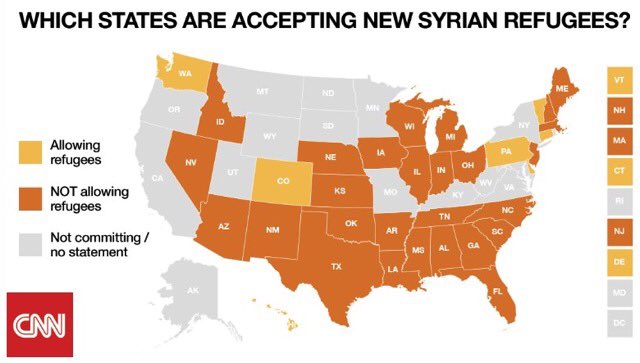Legal Tools to Deter Travel by Suspected Terrorists: A
FAS: The terrorist attacks in Paris last week, for which the Islamic State (sometimes referred to as ISIS, ISIL, or IS) has claimed responsibility, have renewed concerns about terrorist travel. Following reports that at least one of the perpetrators of the attacks was carrying a Syrian passport, there has been heightened scrutiny and debate concerning the resettlement of refugees from war-torn Syria to Europe and the United States. This Sidebar provides a brief overview of some (but by no means all) of the tools the federal government employs to prevent individuals from traveling to, from, or within the United States to commit acts of terrorism. In some cases, the application of these tools may depend on different factors, including whether the suspected terrorist is a U.S. or foreign national.
Terrorist Databases and Screening
Decisions by the federal government as to whether to use a particular tool to deter an individual’s travel are often informed by information collected by various agencies that link that individual to terrorism. The Terrorist Screening Center (TSC)—administered by the Federal Bureau of Investigation (FBI)—maintains the federal government’s Terrorist Screening Database (TSDB), the government’s single source repository watch list record of known and suspected terrorists. TSC provides various federal agencies with subsets of the TSDB for use in combating and deterring terrorism. Some of the many screening systems supported by the TSDB include the Department of State’s Consular Lookout and Support System (CLASS) for screening of passports and visas; the TECS system (not an acronym) administered by Custom and Border Protection within the Department of Homeland Security (DHS) to screen and make eligibility determinations of arriving persons at U.S. ports of entry; the DHS’s Secure Flight system for air passenger prescreening; and the FBI’s National Crime and Information Center’s Known or Suspected Terrorist File. Of course, while the TSDB supplies these systems with information on the identity of suspected terrorists, these systems may also include information on individuals obtained independently from the TSDB consistent with the agency’s particular responsibilities.
No-Fly List and Selectee List
Information compiled by the TSDB may be used to deter suspected terrorists from using civil aircraft and other modes of transportation to travel to, from, or within the United States. The safety of air travel, particularly after the terrorist attacks of September 11, 2001, is an important priority for the U.S. government. The Aviation and Transportation Security Act of 2001 created the Transportation Security Administration (TSA) and charged it with ensuring the security of all modes of transportation, including civil aviation. Two of the most prominent means by which TSA attempts to deter terrorist travel is via two watch lists comprised of information from the TSDB – the No-Fly List and the Selectee List. Persons on the No-Fly list are prohibited from boarding an American airline or any flight that comes in contact with U.S. territory or airspace. Those on the Selectee List are subject to enhanced screening procedures.
Criminal Sanctions
Perhaps the most severe means by which to prevent persons from traveling to, from, or within the United States for terrorist purposes is through the use of criminal sanctions. A wide range of terrorism-related conduct is subject to criminal penalty under U.S. law. Many of the most relevant criminal statutes are extraterritorial in reach, covering conduct which may occur partially or (in more limited cases) entirely outside the United States. Persons who aid and abet a criminal violation may typically be held criminally liable for the underlying offense to the same degree as the person who directly committed the violation. Attempts or conspiracies to commit proscribed conduct are also typically subject to criminal punishment. Several U.S. persons accused of attempting or conspiring to assist the Islamic State, including through either encouraging others to travel abroad to join the group or planning to join the group themselves, have been charged with terrorism offenses.
Probable cause is required to arrest a person for a criminal violation, and proof beyond a reasonable doubt is necessary to sustain a conviction. Law enforcement’s suspicion that a traveler may be involved in terrorist conduct (or associated with others who have terrorist ties) may not be sufficient to warrant the traveler’s arrest. As a result, government officials may sometimes deploy tools other than criminal sanctions to deter travel by persons suspected of terrorist activity.
Passport Restrictions on Travel to Specific Countries
Through the revocation or denial of passports, U.S. authorities could potentially impede the international travel of U.S. citizens suspected of terrorist involvement or association with an enemy belligerency. Federal law provides that, except as authorized by the President, a U.S. citizen may not depart from the United States and travel to another country unless he bears a valid passport. The revocation of the passport of a U.S. citizen located abroad may also have implications for his ability to remain in a particular foreign country, or travel from there to a third country. While federal statute provides that U.S. citizens also may not reenter the country unless they bear a valid passport, U.S. citizens who travel abroad appear to enjoy a constitutional right to be readmitted back into the United States.
State Department regulations identify various grounds for which passport applications may be denied or a previously issued passport may be revoked. Several such grounds may be relevant to efforts to deter international travel by U.S. citizens suspected of involvement with terrorist groups, including those permitting the denial or revocation of passports to U.S. citizens who are the subject of outstanding felony arrest warrants or requests for extradition. The regulations also provide that a U.S. citizen’s passport application may be denied or revoked when the Secretary of State “determines that the applicant’s activities abroad are causing or are likely to cause serious damage to the national security or the foreign policy of the United States.” However, the authority to deny or revoke passports on account of national security or foreign policy concerns is not absolute. The Supreme Court has recognized that the State Department lacks statutory authority to deny a passport solely on the basis of the applicant’s political beliefs; the denial must be based in part upon actual conduct that causes serious damage to the national security or foreign policy of the United States.
In addition to regulatory authority to deny or revoke passports, State Department regulations also permit the Secretary of State to restrict the usage of U.S. passports to travel to a country or area in certain cases – including when the Secretary has determined the country or area is a place where “armed hostilities are in progress” or there exists “an imminent danger to the public health or physical safety of United States travelers.” Such restrictions have been imposed on a number of occasions, including restricting the use of a U.S. passport to travel to Iraq from 1991 until late 2003, on account of hostilities occurring in that country and the potential dangers posed to U.S. travelers.
Immigration
Perhaps the most effective and commonly employed means to deter non-U.S. nationals (aliens) suspected of terrorist activity from traveling to the United States derive from federal immigration law. Rules governing whether and when aliens may be admitted into the United States, along with the conditions for their continued presence in the country, are primarily found in the Immigration and Nationality Act (INA). The INA establishes several grounds for which an alien suspected of terrorist activity may be barred from admission into the United States, including persons seeking to come to the United States as refugees. Under INA §212(f), the President is also conferred with broad authority to act, by means of proclamation, to bar the entry of an alien or class of aliens into the United States if he deems their entry detrimental to U.S. interests, though usage of this authority has been relatively rare. While programs like the No-Fly List may prevent suspected foreign terrorists from coming to the United States via a particular mode of transportation, federal immigration rules and requirements may prevent such persons from traveling to the United States using any mode of transport.
The INA generally provides that aliens who are seeking initial admission into the country bear the burden of proving they are admissible. Moreover, judicial review of a decision by a consular officer abroad to deny an alien a visa to come to the United States, or a determination made by customs and border officials at a U.S. port of entry that an arriving alien is inadmissible on terrorism-related grounds, may be quite circumscribed or virtually non-existent. Aliens who have been lawfully admitted into the country might also be removed from the United States for the same terrorism-related reasons as aliens seeking initial admission into the country. In the case of lawfully admitted aliens, however, federal immigration authorities bear the evidentiary burden of demonstrating that the alien’s activities render him deportable before the alien may be ordered removed. There may also be greater availability of judicial review than in cases where an alien has not yet been lawfully admitted. Moreover, if a lawful permanent resident alien (sometimes described as an “immigrant”) travels briefly abroad and seeks to return to the United States, he may be afforded greater procedural and substantive protections than other aliens who attempt to travel to the United States.
Immigration rules and requirements do not apply to U.S. citizens. Whereas an alien suspected of terrorism-related travel to the United States may be barred from admission into the country, other methods would need to be employed (e.g., placement on the No-Fly List, criminal prosecution, passport restrictions) to deter U.S. citizens from traveling to, from, or within the United States for terrorist purposes.













 Kyle W. Orton
Kyle W. Orton 
 Brian P. Mangan
Brian P. Mangan 